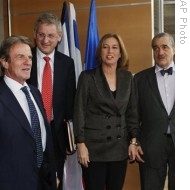VOA标准英语2009年-Humanitarian Efforts Struggle Along Egypt-Gaza(在线收听)
 |
| From left, European Commissioner for External Relations Waldner, Czech FM Schwarzenberg, Israeli FM Livni, Swedish FM Bildt in Jerusalem, 05 Jan 2009 |
World leaders met Monday at the Red Sea resort town of Sharm el Sheikh. But just a short drive north on the Sinai Peninsula, the sound of waves crashing against the shore was replaced by bombs along the Gaza border in Rafah.
Standing at the edge of town, which is the only official crossing between the Gaza Strip and Egypt, one can see the war raging. Unmanned Israeli spy drones hover overhead 24 hours a day.
After nearly a year-long blockade that has seen few goods allowed into Gaza, the last 10 days of violence have left hundreds of Palestinians dead and some 2,500 wounded.
 |
| A wounded Palestinian child being carried to the Shifa Hospital in Gaza City, 05 Jan 2009 |
There is widespread sympathy in Egypt for the people of Gaza. But with few options for affecting the situation, many people in Egypt and across the Muslim world are responding through charity.
Pharmacist Aala Masoud has spent his New Year's holiday volunteering in Rafah. But it has not been easy.
Masoud spent all day and all night traveling from his home in Alexandria to bring some 10 tons of medicine and medical supplies. Masoud and his team of volunteers had to pass through 11 check points due to increased security in the Sinai. Once at Rafah, Masoud and his team heard Israeli F-16 fighter jets opening fire just kilometers away.
But he says the dangers were worth it. For Masoud, the moment the supplies reached the border was the happiest moment of his life.
He says all of Gaza is suffering and that he doubts that anyone there can do more than what he and others like him are attempting. Masoud says he traveled for 24 hours without sleep or food to deliver supplies because humanity requires him to do so.
There are dozens more volunteers at Egypt's border with Gaza not waiting to see whether meetings in Sharm el Sheikh or at the United Nations in New York can resolve the crisis. Protests across the Arab world have flared for days and much of the anger has been directed at Arab governments for not doing more to stop the heavy Israeli response to Palestinian rocket attacks.
 |
| A wounded Palestinian boy is treated at the Shifa Hospital in Gaza City, after an Israeli missile strike, 05 Jan 2009 |
Mohamed Khawaldi, a Jordanian neurosurgeon, is one of at least 20 doctors who have come from across the Mideast to help. He says he is not interested in the politics of the crisis.
He says the doctors are there to heal. Dr. Khawaldi says he will remain at the Gaza border until he is allowed in. "There is no returning home until the war ends and everything is O.K.," he says.
Israel, which controls all of Gaza's borders, has not allowed doctors to enter. But some medical supplies from as far away as Turkey, Qatar, Saudi Arabia and Indonesia have been able to reach Gaza through Rafah.
There is no guarantee that the Egypt-Gaza border will be opened to doctors or that medical supplies will eventually reach areas where they are needed most. So for now, the tense Rafah border crossing is an uncertain refuge for people waiting patiently for peace.